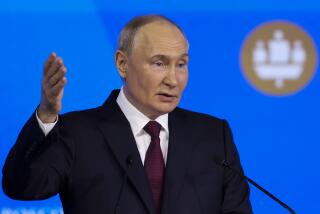Yeltsin Stands Firm on Challenges : Russia: President emphasizes resolve against banned front, takes tough line on rumors of Cabinet changes.
- Share via
MOSCOW — Testing Russian President Boris N. Yeltsin’s political will, dozens of members of the banned National Salvation Front tried to gather at a central Moscow building Tuesday but found the door solidly blocked by police.
When Yeltsin issued his decree last month banning the reactionary front as an intolerable threat to his reforms, he meant it. And now, with just two weeks left before a crucial Parliament session at which his opposition wants his entire Cabinet removed, the Russian president chose this strategic moment to emphasize his resolve.
At a Kremlin meeting, Yeltsin also took a tough line concerning rumors that he was freeing up Cabinet posts and changing his policy line in exchange for support from conservative factions in Parliament. “I can say firmly that I won’t go for any replacement of the reforms, and it’s pointless to bargain with me on the composition of the Cabinet,” he told lawmakers.
Yeltsin continued to sound vague about the prospect that he might introduce direct presidential rule and dissolve the Parliament if it attacks him too sharply.
“Do you really think that the president will violate the constitution?” he asked lawmakers rhetorically. But he added: “It’s something else again if the Congress tries to turn back reforms. Then the president should defend the will of the people.”
Yeltsin banned the National Salvation Front late last month in a similar unyielding mood after the new group gathered about 2,000 followers and called for the Cabinet’s resignation and, as a last resort, Yeltsin’s impeachment.
It remains unclear whether Yeltsin had the right to ban the front. Its leaders said they were appealing to the Constitutional Court, Russia’s highest judicial body, to have the decree overturned.
They acknowledge that the front opposes Yeltsin’s concerted push toward a market economy and calls for a return to Communist-style central planning and social guarantees. But members maintain that they wish to pursue their goals only through constitutional means and that the court will legalize them anew.
Meanwhile, the battle between Yeltsinites and the front made for some good political drama. The Moscow police guarding the Russian Writers’ Union building in the evening snow looked sheepish as they told dozens of front members and reporters that they could not enter because a bomb threat had been phoned in and dogs were busy sniffing around inside.
Ilya Konstantinov, a lawmaker and a front leader, called the bomb threat “a children’s story.” He said Moscow authorities had forbidden the meeting, which had been meant to discuss political tactics and the coming Congress of People’s Deputies, in accord with Yeltsin’s ban.
Vladimir Isakov, another front leader, said the group is calling only for the resignation of the Cabinet at this point. But if Yeltsin tells the Congress of People’s Deputies, which is to convene Dec. 1, that he refuses to alter his reforms, “We will be forced into a sharp conflict with the president, right up to impeachment and the election of a new president,” Isakov said.
The Congress has the power to deprive Yeltsin of his special decree-making powers and can call a vote of no confidence in his Cabinet. Isakov contended that the front has the support it needs among Congress deputies, who are largely conservative, to gain its main objectives.
But Yeltsin got a vote of support from provincial leaders gathered in the Russian capital Tuesday. The chiefs of Russia’s far-flung provinces said in a statement, “We support the decisive actions of the Russian president, aimed at speeding up and developing the process of reforms in Russia and checking any attempts to hamper them.”
More to Read
Sign up for Essential California
The most important California stories and recommendations in your inbox every morning.
You may occasionally receive promotional content from the Los Angeles Times.










